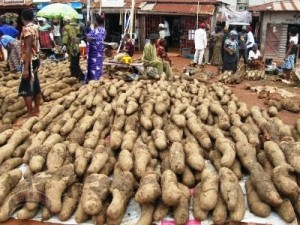My friend grew up in Nigeria before coming to the US for college. He says yams are life in Nigeria.
Friend:“The yam is the staple food and therefore a measure of masculinity and wealth. If a family has a lot of yams, you’re rich because you can feed your family. This makes you a strong man. Yams are equated to life in Igbo culture. Nigeria is the leading producer of yams in the world, so of course they are a big deal to us.”
Me: Do you still have family who farm yams?
Friend: “My father does not farm yams, but my grandfather did, and his father before him. When my grandfather got married, he had to present his yams to my grandmother’s family to prove he could provide for her, which is a fairly typical custom in Nigeria.”
Me: Is there anything specific about how yams are farmed that makes them special?
Friend: “On some farms in Nigeria, the women aren’t allowed to go to the farm until harvest time. Then the women do all of the harvest work. It’s superstition I guess. There are many people today who still grow yams. Yams are featured at any big gathering or at any holiday meal.”
Analysis: Many cultures have some form of staple food. For the Irish, potatoes are an important part of sustenance, and therefore are a large part of how people live. Because of this, a simple food like a potato, or yam, can come to have symbolic meaning. What a family produces in terms of yams, and how it relates to masculinity is extremely interesting, given that yams are an unpredictable measure of success. One year, the harvest could be plentiful and the weather perfect. The next year, however, bad luck could lead to very few yams. Another aspect of this folklore worth noting is that while the men do the initial farming, the women do the harvesting. Perhaps this relates to the hunter/gatherer trope, but a man’s worth relies on work which is half done by women.

